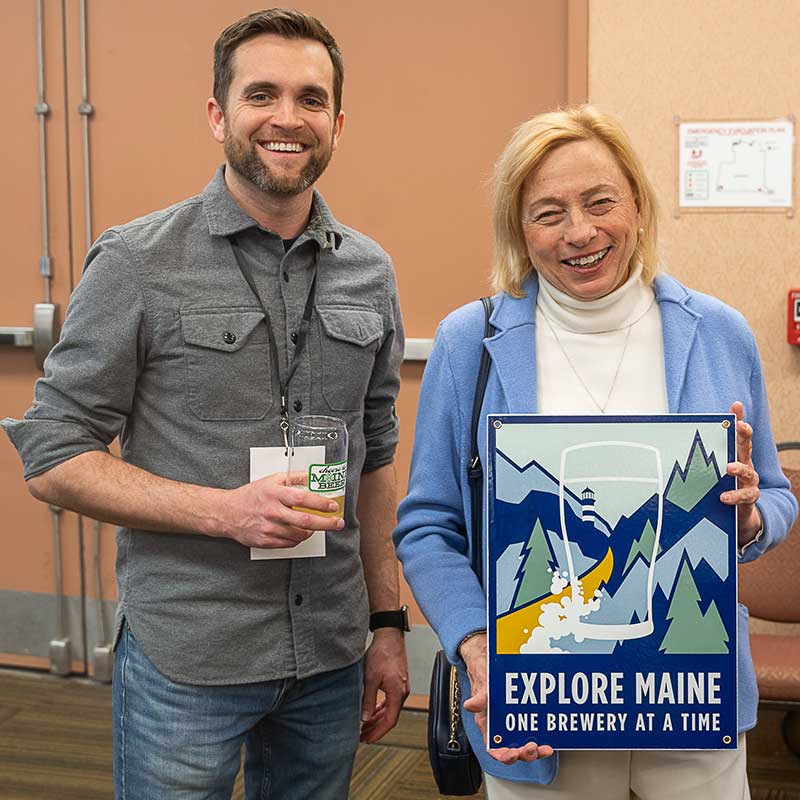Khoury News
Brew to Roux: Sean Sullivan jumps from craft beer trade group to Align master’s program
As the executive director of the Maine Brewer’s Guild, Sean Sullivan led an industry that has helped to change the state’s economy. But after nearly ten years of promoting craft […]

As the executive director of the Maine Brewer’s Guild, Sean Sullivan led an industry that has helped to change the state’s economy. But after nearly ten years of promoting craft beer, he’s taking on an entirely new challenge this year at the Roux Institute in Portland, Maine. There, he’s studying computer science through Align, Khoury College’s master’s program for students who studied something other than CS as undergrads.
“I love bringing people together who share a common interest and learning from the community to expand my horizons,” Sullivan says.
That ethos underpinned his time as the first director of the Guild, a nonprofit trade association which grew out of a monthly networking meetup for environmentally focused young professionals.
“I joined the Guild at a time when the industry was poised for big growth. There were misconceptions about our industry in the state, outdated laws which were restricting growth, and a lack of a central gravity point for the startups who were opening breweries,” Sullivan explains. “Working across industries and around the state, I found a lot of value in serving as a translator between our professional brewing community and legislators, tourists, and the public.”
During Sullivan’s time as executive director, the craft brewing industry in Maine grew exponentially, from 40 breweries when he started in 2013 to more than 175 today.
“Today, all of Maine’s sixteen counties have at least a couple of breweries, and I am proud that we’ve fostered that entrepreneurial energy around the state,” Sullivan says.
Transitioning from an executive director of a trade association to a master’s student of computer sciences requires motivation and embracing dramatic change, and Sullivan is ready for all of it. His interest in computer science kicked off early in his career, as he was building a fintech startup with a business partner. After attending a startup event in Portland in 2012, Sullivan and his partner founded a gift card company which capitalized on the ‘Buy Local’ movement while helping independently owned businesses in the city.
“We started creating and providing our customers with these basic data visualizations,” Sullivan remembers. “It helped me realize that if you understood the technology, you could create a lot of value.”
Sullivan has always pushed himself out of his comfort zone toward new things, and his new educational path in technology is no different.
“This is not a subtle career move; this is a radical shift. When I envision my future career, I see opportunities to build something even bigger, but the foundation of that vision is rooted in technological knowledge,” Sullivan says. “The communities that most inspire me today aren’t bound by geography, defined industries, or legal structures, but they are driven by technology.”
And when it came time to choose an institution for that radical shift, Sullivan, who relished the chance to contribute to communities with bold visions, saw the same quality in the Roux Institute.
“When I look at the vision for Roux, there’s nothing small about it, and Northeastern’s co-op model really appealed to me because when you’re making a career switch like I am, it’s hard to write that résumé,” Sullivan said.
Sullivan hopes he can contribute to the Roux’s effort to build a new narrative for Maine, one where the state is known for leadership in computer science, data science, and artificial intelligence.
“I expect to be part of this effort and to get a ground-floor view into how a big institution with a bold vision navigates through the challenges inherent to any pioneering effort,” Sullivan says. “I expect to be part of this first wave of students who begin to realize this potential, and as part of that, connect to a whole new community of people who are more technically inclined and focused.”
“I am proud of my career to date, but I am no longer willing to simply wonder what is below the surface,” he adds. “I need a new set of tools to fulfill my professional potential, and I know the master’s program at Roux will teach me how to use these tools so I can build the future I see for myself.”
The Khoury Network: Be in the know
Subscribe now to our monthly newsletter for the latest stories and achievements of our students and faculty